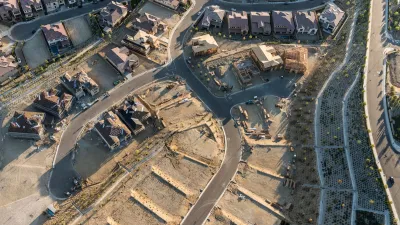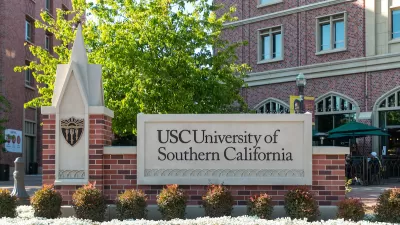While the east coast suffers through a brutal early summer heat wave, researchers in Los Angeles have announced the findings of the most advanced regional climate modeling ever conducted, which shows that So Cal will feel the heat soon enough.
Released this week, "Mid-Century Warming in the Los Angeles Region", which researchers at UCLA are calling "the most sophisticated regional climate study ever developed," shows that "climate change will cause temperatures in the Los Angeles region to rise
by an average of 4 to 5 degrees Fahrenheit by the middle of this
century, tripling the number of extremely hot days in the downtown area
and quadrupling the number in the valleys and at high elevations."
"That's the bad news," writes Damien Newton. "The good news, even by acting locally there is
something that L.A. can do....Today, the City released Adapt LA [PDF],
a fact sheet outlining what principles the city must embrace to both
prepare for higher temperatures and work to keep them as low as
possible, and C-Change LA , its new
climate change website. AdaptLA has four major components: 1)
science-based evaluation of the impacts of climate change; 2) assessment
of the vulnerability of and risks to City infrastructure and assets; 3)
regional collaboration; and 4) public engagement."
The C-Change website outlines the types of things homes and businesses can do to assist in minimizing and responding to climate change. Speaking this week, Mayor Antonio Villaraigosa
outlined some of the ways to keep the city cool: "That could mean replacing
incentives with building codes requiring 'green' and 'cool' roofs, cool
pavements, tree canopies and parks."
"'Mid-Century Warming in the Los Angeles Region' is the first of five
planned studies [UCLA climate expert Alex] Hall will conduct for the city and the LARC about how
climate change will affect the Southland. Hall's team plans to develop
similarly comprehensive models for local rainfall, Santa Ana wind
patterns, coastal fog (including June gloom), and soil moisture, run-off
and evaporation."
FULL STORY: The Keys to Beating, or at Least Fighting, Climate Change: Bikes, Transit, Parks, Trees

Alabama: Trump Terminates Settlements for Black Communities Harmed By Raw Sewage
Trump deemed the landmark civil rights agreement “illegal DEI and environmental justice policy.”

Study: Maui’s Plan to Convert Vacation Rentals to Long-Term Housing Could Cause Nearly $1 Billion Economic Loss
The plan would reduce visitor accommodation by 25% resulting in 1,900 jobs lost.

Planetizen Federal Action Tracker
A weekly monitor of how Trump’s orders and actions are impacting planners and planning in America.

Wind Energy on the Rise Despite Federal Policy Reversal
The Trump administration is revoking federal support for renewable energy, but demand for new projects continues unabated.

Passengers Flock to Caltrain After Electrification
The new electric trains are running faster and more reliably, leading to strong ridership growth on the Bay Area rail system.

Texas Churches Rally Behind ‘Yes in God’s Back Yard’ Legislation
Religious leaders want the state to reduce zoning regulations to streamline leasing church-owned land to housing developers.
Urban Design for Planners 1: Software Tools
This six-course series explores essential urban design concepts using open source software and equips planners with the tools they need to participate fully in the urban design process.
Planning for Universal Design
Learn the tools for implementing Universal Design in planning regulations.
Caltrans
Smith Gee Studio
Institute for Housing and Urban Development Studies (IHS)
City of Grandview
Harvard GSD Executive Education
Toledo-Lucas County Plan Commissions
Salt Lake City
NYU Wagner Graduate School of Public Service





























